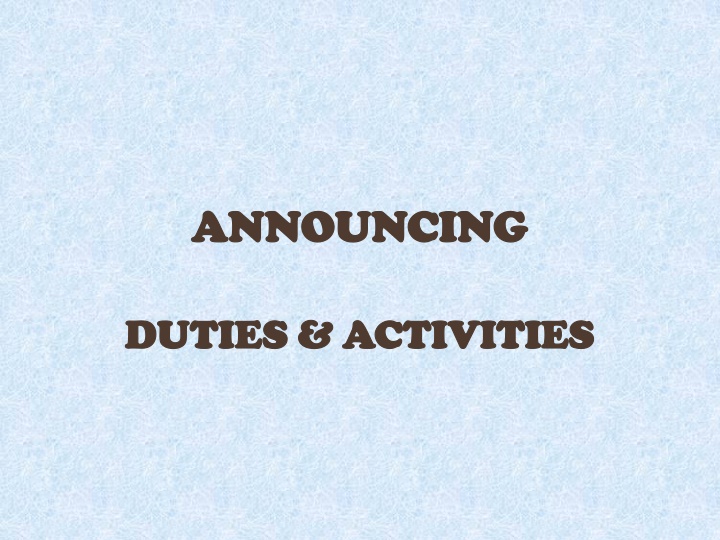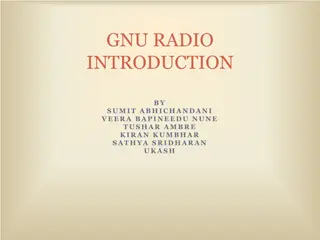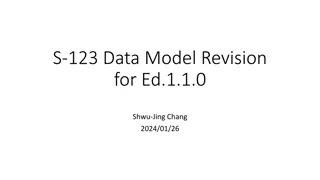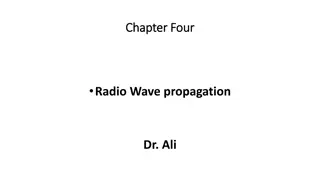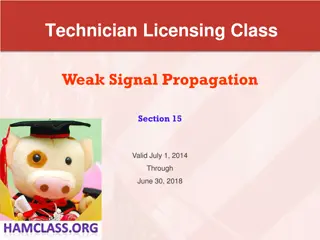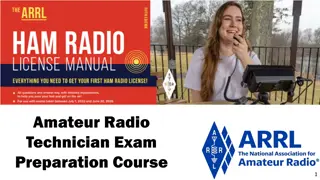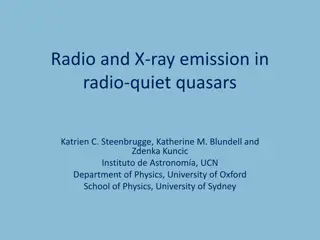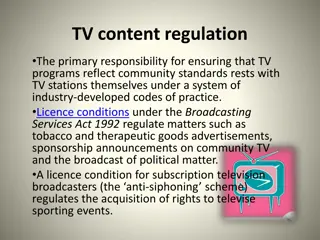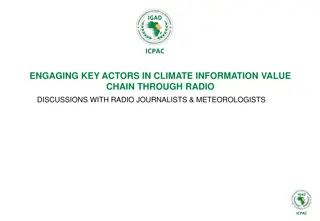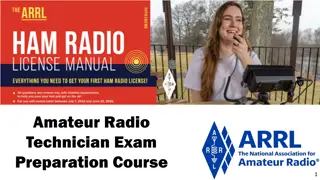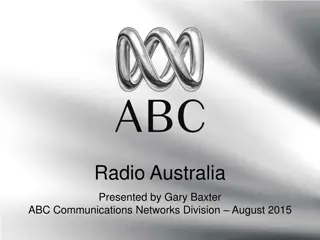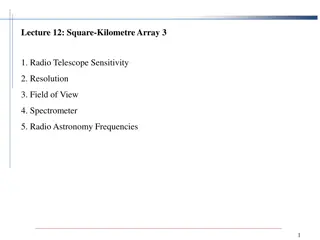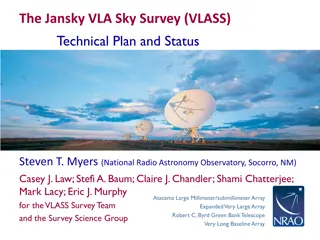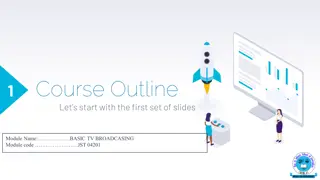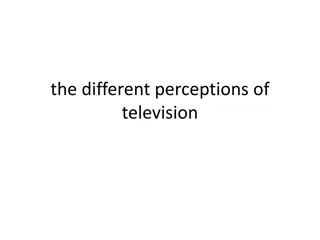Roles and Responsibilities of Radio and Television Announcers
Radio and television announcers play a vital role in presenting program information, news, sports, and commercials to audiences both on and off the air. They read scripts, conduct interviews, moderate discussions, and engage with the community. Announcers at smaller stations often have additional duties such as operating equipment and producing advertisements. Disc jockeys (DJs) handle music selection and provide commentary while on the air. Despite demanding schedules, announcers find satisfaction in their creative work and establishing personal connections with listeners.
Download Presentation

Please find below an Image/Link to download the presentation.
The content on the website is provided AS IS for your information and personal use only. It may not be sold, licensed, or shared on other websites without obtaining consent from the author.If you encounter any issues during the download, it is possible that the publisher has removed the file from their server.
You are allowed to download the files provided on this website for personal or commercial use, subject to the condition that they are used lawfully. All files are the property of their respective owners.
The content on the website is provided AS IS for your information and personal use only. It may not be sold, licensed, or shared on other websites without obtaining consent from the author.
E N D
Presentation Transcript
ANNOUNCING ANNOUNCING DUTIES & ACTIVITIES DUTIES & ACTIVITIES
Nature of the Work Radio and television announcers perform a variety of tasks on and off the air. They announce station program information, such as program schedules and station breaks for commercials, or public-service information, and they introduce and close programs. Announcers read prepared scripts or make ad-lib commentary on the air as they present news, sports, the weather, the time, and commercials. Announcers also interview guests and moderate panels or discussions. Some provide commentary for the audience during sporting events, at parades, and on other occasions. Announcers often are well known to radio and television audiences and may make promotional appearances and do remote broadcasts for their stations.
Announcers at smaller stations may have more off-air duties as well. They may operate the control board, monitor the transmitter, sell commercial time to advertisers, keep a log of the station's daily programming, and produce advertisements and other recorded material. At many radio stations, announcers do much of the work previously performed by editors and broadcast technicians, such as operating the control board, which is used to broadcast programming, commercials, and public-service announcements according to the station's schedule. Announcers frequently participate in community activities. Sports announcers, for example, may serve as masters of ceremony at sports club banquets or may greet customers at openings of sporting-goods stores.
Radio announcers who broadcast music often are called DISC JOCKEYS (DJS). Some DJs specialize in one kind of music, announcing selections as they air them. Most DJs do not select much of the music they play (although they often did so in the past); instead, they follow schedules of commercials, talk, and music provided to them by management. While on the air, DJs comment on the music, weather, and traffic. They may take requests from listeners, interview guests, and manage listener contests. Show hosts may specialize in a certain area of interest, such as politics, personal finance, sports, or health. They contribute to the preparation of the program's content, interview guests, and discuss issues with viewers, listeners, or the studio audience.
Work environment. Announcers usually work in well-lighted, air-conditioned, soundproof studios. Announcers often work within tight schedules, which can be physically and mentally stressful. For many announcers, the intangible rewards creative work, many personal contacts, and the satisfaction of becoming widely known far outweigh the disadvantages of irregular and often unpredictable hours, work pressures, and disrupted personal lives. The broadcast day is long for radio and TV stations many are on the air 24 hours a day so announcers can expect to work unusual hours. Many present early-morning shows, when most people are getting ready for work or commuting, while others do late-night programs. The shifts, however, are not as varied as in the past, because new technology has allowed stations to eliminate most of the overnight hours.
RADIO ANNOUNCERS WHO BROADCAST MUSIC OFTEN ARE CALLED DISC JOCKEYS, OR DJS.
Qualifications. Announcers must have a pleasant and well-controlled voice, good timing, excellent pronunciation, and correct grammar. College broadcasting programs offer courses, such as voice and diction, to help students improve their vocal qualities. Television announcers need a neat, pleasing appearance as well. Knowledge of theatre, sports, music, business, politics, and other subjects likely to be covered in broadcasts improves one's chances for success.
Announcers, especially those seeking radio careers, should have good information technology skills and be capable of using computers, editing equipment, and other broadcast- related devices because new advances in technology have made these abilities important. Announcers also need strong writing skills, because they normally write their own material. In addition, they should be able to ad lib all or part of a show and to work under tight deadlines. The most successful announcers attract a large audience by combining a pleasing personality and voice with an appealing style.
Qualities: Dependability Job requires being reliable, responsible, and dependable, and fulfilling obligations. Integrity Job requires being honest and ethical. Stress Tolerance Job requires accepting criticism and dealing calmly and effectively with high stress situations. Initiative Job requires a willingness to take on responsibilities and challenges. Self Control Job requires maintaining composure, keeping emotions in check, controlling anger, and avoiding aggressive behaviour, even in very difficult situations.
Cooperation Job requires being pleasant with others on the job and displaying a good-natured, cooperative attitude. Adaptability/Flexibility Job requires being open to change (positive or negative) and to considerable variety in the workplace. Attention to Detail Job requires being careful about detail and thorough in completing work tasks. Independence Job requires developing one's own ways of doing things, guiding oneself with little or no supervision, and depending on oneself to get things done. Innovation Job requires creativity and alternative thinking to develop new ideas for and answers to work- related problems.
Work activities: Getting Information Observing, receiving, and otherwise obtaining information from all relevant sources. Thinking Creatively Developing, designing, or creating new applications, ideas, relationships, systems, or products, including artistic contributions. Communicating with Persons Outside Organization Communicating with people outside the organization, representing the organization to customers, the public, government, and other external sources. This information can be exchanged in person, in writing, or by telephone or e-mail. Performing for or Working Directly with the Public Performing for people or dealing directly with the public. This includes serving customers in restaurants and stores, and receiving clients or guests.
Identifying Objects, Actions, and Events Identifying information by categorizing, estimating, recognizing differences or similarities, and detecting changes in circumstances or events. Interacting With Computers Using computers and computer systems (including hardware and software) to program, write software, set up functions, enter data, or process information. Updating and Using Relevant Knowledge Keeping up-to- date technically and applying new knowledge to your job. Establishing and Maintaining Interpersonal Relationships Developing constructive and cooperative working relationships with others, and maintaining them over time. Interpreting the Meaning of Information for Others Translating or explaining what information means and how it can be used.
Skills: Speaking Talking to others to convey information effectively. Active Listening Giving full attention to what other people are saying, taking time to understand the points being made, asking questions as appropriate, and not interrupting at inappropriate times. Critical Thinking Using logic and reasoning to identify the strengths and weaknesses of alternative solutions, conclusions or approaches to problems. Reading Comprehension Understanding written sentences and paragraphs in work related documents. Social Perceptiveness Being aware of others' reactions and understanding why they react as they do.
Time Management Managing one's own time and the time of others. Writing Communicating effectively in writing as appropriate for the needs of the audience. Coordination Adjusting actions in relation to others' actions. Judgment and Decision Making Considering the relative costs and benefits of potential actions to choose the most appropriate one. Active Learning Understanding the implications of new information for both current and future problem-solving and decision-making
Speech Recognition The ability to identify and understand the speech of another person. Oral Expression The ability to communicate information and ideas in speaking so others will understand. Speech Clarity The ability to speak clearly so others can understand you. Oral Comprehension The ability to listen to and understand information and ideas presented through spoken words and sentences. Written Comprehension The ability to read and understand information and ideas presented in writing.
Written Expression The ability to communicate information and ideas in writing so others will understand. Originality The ability to come up with unusual or clever ideas about a given topic or situation, or to develop creative ways to solve a problem. Inductive Reasoning The ability to combine pieces of information to form general rules or conclusions (includes finding a relationship among seemingly unrelated events). Information Ordering The ability to arrange things or actions in a certain order or pattern according to a specific rule or set of rules (e.g., patterns of numbers, letters, words, pictures, mathematical operations).
Duties & Responsibilities: To write announcements and broadcast them. To play back recordings of music and other programmes while announcing them. To write presentation scripts for special programmes of music, including the selection of records etc. To reply to listeners letters. To fill in the fault reports, log books,etc., for the transmissions in which they are on duly.
To take part in features,plays,special audience programmes etc. To read scripts,commentaries,short stories etc.,written by staff or outsiders. To help and present programmes for special audiences. Compeering of various categories of programmes. To maintain registers and index relating to the special programmes activity. Any other duties, which may be assigned from time to time.
